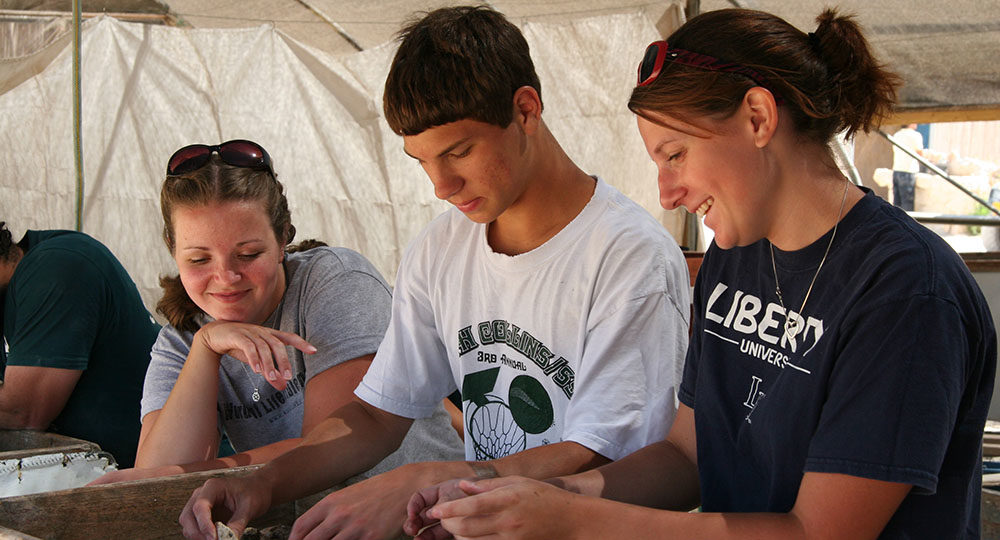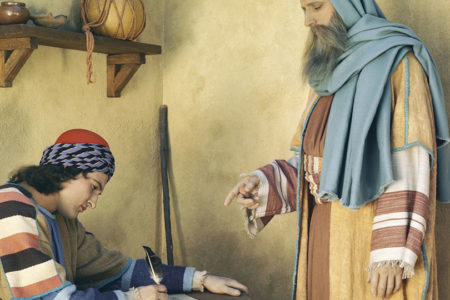Bulla Lessons From Jeremiah 36
It’s a fact. The deeper archaeologists dig, the more Jewish history they find. With so much physical evidence to support the Bible, it’s amazing so many people remain unresponsive toward Scripture. Yet, in these last days, God is supporting His truth, literally from out of the ground: “Truth shall spring out of the earth, and righteousness shall look down from heaven” (Ps. 85:11).
During the 1970s and early 1980s, some remarkable finds were uncovered in Jerusalem. Excavators came upon a cache of various clay bullae. A bulla is a small, flattened lump of hardened clay that was used as a seal on official documents. The sender’s name or signet-ring image would be impressed on the clay. It served much like a postal stamp.
Apparently, the fire that destroyed Jerusalem in 586 B.C. actually hardened the clay seals and preserved them. Many of the bullae found contained the names of individuals mentioned in Jeremiah 36. Their names have some-thing to reveal.
Baruch ben Neriah: Faithful
It was a time of impending calamity for the southern kingdom of Judah. One man, Jeremiah, stood practically alone, seeking to stem the tide of the nation’s apostasy. By his side was his faithful scribe, Baruch ben Neriah. Baruch’s ministry was to write down accurately all of the prophet’s messages. A bulla seal that came to light and was studied by a prominent Israeli archaeologist was that of Jeremiah’s scribe. The inscription reads, “Berekhyahu son of Neriyahu the scribe.” Baruch’s full name was Berekhyahu, meaning “the blessed of Yahweh.”
Jeremiah gave Baruch a difficult assignment:
Then Jeremiah called Baruch the son of Neriah; and Baruch wrote on a scroll of a book, at the instruction of Jeremiah, all the words of the Lᴏʀᴅ which He had spoken to him. And Jeremiah commanded Baruch, saying, “I am confined, I cannot go into the house of the Lᴏʀᴅ. You go, therefore, and read from the scroll which you have written at my instruction, the words of the Lᴏʀᴅ, in the hearing of the people in the Lᴏʀᴅ’s house on the day of fasting. And you shall also read them in the hearing of all Judah who come from their cities. It may be that they will present their supplication before the Lᴏʀᴅ, and everyone will turn from his evil way. For great is the anger and the fury that the Lᴏʀᴅ has pronounced against this people” (Jer. 36:4–7).
This was a critical moment in Judah’s history. If the nation repented, the Lord would forgive. If not, God was ready to unleash the might of Babylon as His divine judgment.
So Baruch went to the Temple and read Jeremiah’s prophetic messages of warning (v. 8). He then was led into a room in the palace where all the king’s officials gathered. He sat and read the scroll before them (vv. 11–15). They trembled over what they heard, saying the king must also hear Jeremiah’s messages (v. 16).
But after hearing God’s warning, wicked King Jehoiakim cut the scroll into pieces and tossed it into the fire. Neither he nor his officials showed any godly fear over what they heard (vv. 21–24).
Baruch did not see any response of repentance, but he was faithful to his ministry. He went as instructed and read God’s words. As his name indicates, he was blessed as God’s minister. He was also a source of God’s blessing as a bearer of God’s Word.
Results and outcomes in ministry are in God’s hands. Baruch’s testimony, represented by a small bulla now in the Israel Museum, is faithfulness. Some will hear and receive the Word; others will not. Nevertheless, we continue to minister. As Paul told Timothy, “Preach the word! Be ready in season and out of season. Convince, rebuke, exhort, with all longsuffering and teaching” (2 Tim. 4:2).
Gemariah, Son of Shaphan: Courageous
“Nevertheless Elnathan, Delaiah, and Gemariah implored the king not to burn the scroll; but he would not listen to them” (Jer. 36:25)
Another artifact that has come to light is a clay-disk bulla seal that reads, “belonging to Gemaryahu, son of Shaphan.” Gemaryahu (English, Gemariah) had a chamber in the Temple. It was in his room Baruch the scribe stood and read Jeremiah’s alarming prophecy before all the people (v. 10).
Gemaryahu means “Yahweh has accomplished or perfected.” He and two other officials demonstrated moral courage and conviction when they pleaded with King Jehoiakim not to burn the scroll (v. 25).
Interestingly, one of the officials mentioned was Elnathan. It was he who previously hauled the prophet Urijah from Egypt, resulting in the prophet’s murder by Jehoiakim (cf. 26:20–23). After that event, he appears to have been a changed man.
Perhaps Elnathan’s change of heart was due to Gemariah’s witness and testimony. It was during the reign of godly Judean King Josiah when the scroll of the Law was discovered in the Temple. Shaphan, Gemariah’s father, had the Scripture read to the people. A great renewal of obedience and faith resulted (cf. 2 Ki. 22:3—23:3).
We don’t know what happened to Gemariah. He may have perished during Babylon’s siege of Jerusalem or died in captivity in Babylon. But the discovery of Gemariah’s bulla is a reminder of someone who honored God’s Word despite the danger and lived out Psalm 31:1: “In You, O Lᴏʀᴅ, I put my trust; let me never be ashamed; deliver me in Your righteousness.”
Elishama the Scribe: Unreceptive
Another interesting bulla from the Jerusalem hoard was impressed with the name of Elishama the scribe. The inscription actually read, “Elishama, servant of the king.”
After Baruch read the prophecies in the Temple, an official requested the scroll be read “in the hearing of the king and in the hearing of all the princes [rulers] who stood beside the king” (Jer. 36:21). This included Elishama the scribe.
Baruch left the scroll for safekeeping in Elishama’s manuscript chamber. Later the king had someone fetch the scroll and read it before him. Elishama probably saw the king desecrate the document (vv. 11–23).
The episode closes with, “Yet they were not afraid, nor did they tear their garments, the king nor any of his servants who heard all these words” (v. 24). Unlike Gemariah and others, “Elishama, servant of the king” did not beg the king to stop his sacrilege. His name in Hebrew means “God has heard.”
God certainly heard his silence by his inaction. There will always be those who fear man rather than God. The king may have cut and burned the scroll, but Elishama chose to shred the Word in his heart, showing neither fear nor repentance.
The excavated seal-bullae found in Jerusalem are insightful. They verify the existence of the individuals in Jeremiah 36 whose names are full of personal meaning and application. It is interesting to see how different people responded to God’s Word.
For the word of God is living and powerful, and sharper than any two-edged sword, piercing even to the division of soul and spirit, and of joints and marrow, and is a discerner of the thoughts and intents of the heart. And there is no creature hidden from His sight, but all things are naked and open to the eyes of Him to whom we must give account (Heb. 4:12–13).
Baruch the scribe, Gemariah son of Shaphan, and Elishama the scribe all lived during tumultuous times. Today is equally as ominous. How will you respond to Scripture while there is still time?








Interesting my last name is Bulla. I pastored for 42 years and have always loved history my daughter sent me an article a few years ago about the discovery of Isaiah’s bulla, it was then I learned the meaning of our name.